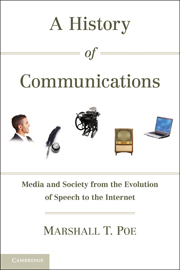Conclusion - The Media and Human Well-Being
Published online by Cambridge University Press: 05 June 2012
Summary
In our days, everything seems pregnant with its contrary: machinery, gifted with the wonderful power of shortening and fructifying human labor, we behold starving and overworking it.
– Karl Marx, 1856Marx worshiped technology. Thanks to labor-saving machines, he predicted, one day we would all be free to “hunt in the morning, fish in the afternoon, rear cattle in the evening, criticize after dinner.” One day, but not in his day. Marx looked around his mid-nineteenth century world and saw, much to his horror, that capitalists were using the technical instruments of emancipation to bind their fellow men. “At the same pace that mankind masters nature,” he wrote, “man seems to become enslaved to other men.” The problem was not the tools. They had “revolutionized industrial production,” thereby setting the stage for a new epoch of human fulfillment. The problem was the way we – humanity – used these tools. Marx told a story of technical progress, and so have we. He described the “forces of production” marching to ever greater heights, and we have described the “forces of communication” doing the same. But Marx, as we’ve seen, was careful to distinguish technical progress from moral progress. He saw a lot of the former and very little of the latter. We would be remiss not to make the same distinction. It may seem obvious to us that each successive media – writing, print, audiovisual devices, and the Internet – has been “better” than the last. In a technical sense, this is true. But in an ethical sense, the case is much less sure. A tool is only as good as the purposes to which we put it. It seems only fitting, then, that we conclude our consideration of the media by asking whether we have been using them to improve our well-being or not.
In order to answer this question, we need to be rather specific about what we mean by “improve our well-being.” That is not easy. People have been arguing about just what makes people “happy” – to put a word on it – for millennia. More than 2,000 years ago, Aristotle, who proposed his own theory on the subject, noted there was a lot of disagreement about just what happiness is. There's just as much today. Is it better to be an unhappy Socrates or a happy pig? To answer that question, you’d have to know what happiness is, and nobody seems to know. You’d also have to talk to a pig, and nobody seems to know how to do that, either.
- Type
- Chapter
- Information
- A History of CommunicationsMedia and Society from the Evolution of Speech to the Internet, pp. 251 - 276Publisher: Cambridge University PressPrint publication year: 2010



